Of all the games I played in 2020, none have stayed with me with such forceful impact as Final Fantasy VII: Remake, and for good reason. After years upon years of waiting, fans rejoiced seeing the classic 1997 title revived with gorgeous new graphics and an expanded story. It didn’t hurt that Remake was released in April, just as we were beginning to feel the impact of the pandemic and staying indoors for lockdown.
However, months after I played through the final chapter, certain facets still clung to my mind. When a 20+ year old game gets a reboot, one of the most important aspects is staying true to the original, hitting nostalgic beats while ensuring the title is in line with current sentiments. The Wall Market section, for example, is tastefully redone with Cloud still disguising himself as a beautiful woman to infiltrate Don Corneo’s mansion. It tastefully drops the overtly 90s approach of “haha - a man in a dress! How wacky!”
On my second playthrough of Remake, I couldn’t stop focusing on one of my favorite characters from the original game: Barret Wallace. In fact, I became a bit obsessed with culturally dissecting his presentation. I went back and played a bit of the original, supplemented by looking up opinion articles. Perhaps, I was preparing myself for the inevitable question that I - a Black person who happens to be a longtime fan of the series - would be asked: is Barret a racist stereotype?
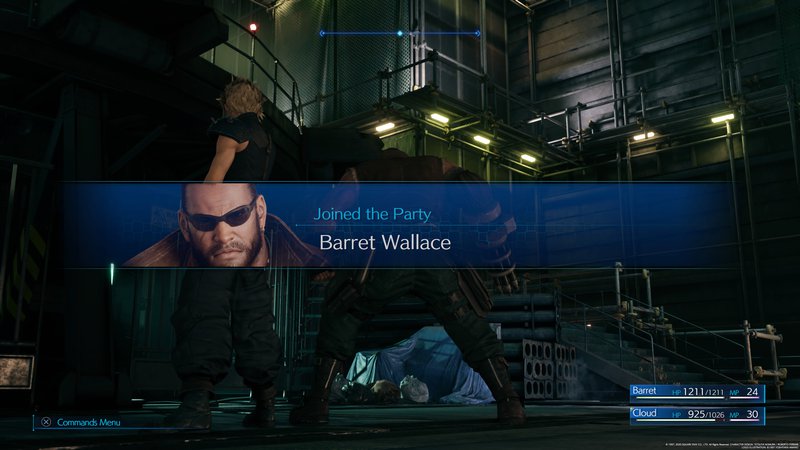
A knee-jerk answer would be yes, with many easily pointing to his speech patterns, character design, and overtly “intense” characterization. However, talking about racial representation in media is a much more richly layered conversation than relying on first impressions. It’s bigger than “blaccents”. The more I focused on Barret’s history as a character, his portrayal in both the original FF7 and Remake, and comparisons with other black characters in video games, the more the answer warranted finesse.
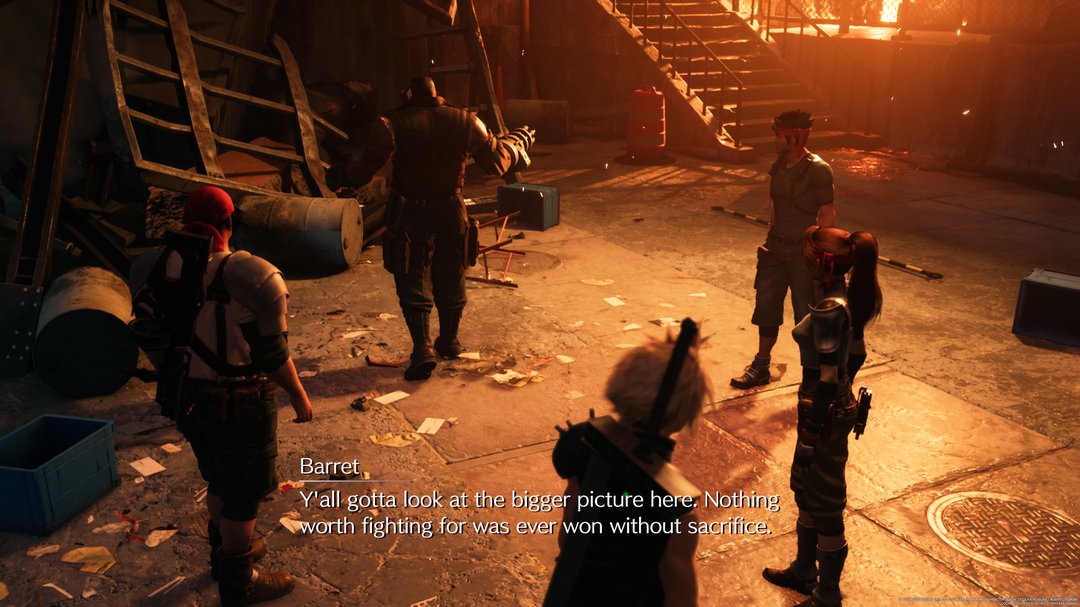
Couldn't have put it better myself!
Peeling Back The Layers Of Racial Representation
First things first: let me say that in this article I’m prefacing all of my arguments from the POV of a Black consumer of media. These very ideas apply to many minority groups, and I in no way mean to discount said groups by not mentioning them. I’m just providing a view of what I have witnessed in my own personal life, and how a character which many people have different opinions on hits home for me.
Between the #BLM movement and having more time to read/watch documentaries in 2020, I personally spent a lot of time ruminating on Black culture, Black history, and Black representation as a whole in the US. Obviously, spending a good portion of time with the first Black character I had ever seen in a fantasy-based video game dovetailed into that. For months before Remake’s release, one of many prominent questions about this reboot is how its main Black character, who was very much drenched in stereotype in the original game, would be updated through a modern prism. Personally, my hope was that Barret would not carry over his broad stereotyped persona, but I also didn’t want his Blackness erased. When Final Fantasy 7: Remake finally arrived, I found it met me somewhere in the middle.
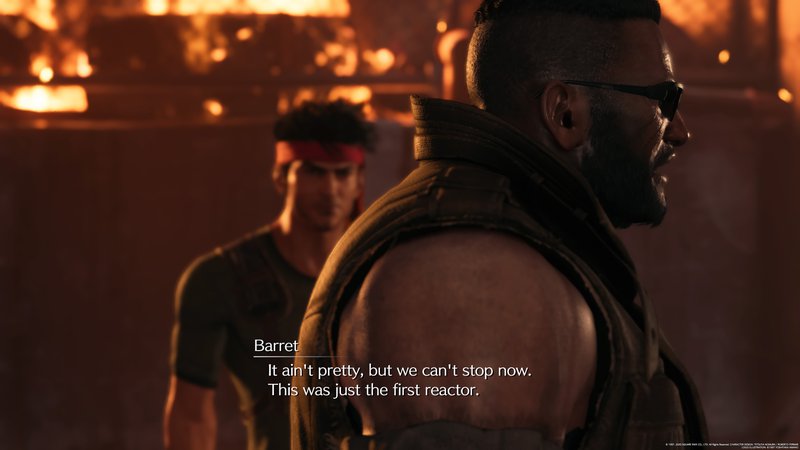
There are many articles throughout the internet condemning his lack of progression from his 1997 counterpart. Jeffrey Rousseau coined him as “Blaxplotation Barret” in his July 2020 Medium article, stating “For many black gaming fans, Barret’s vocal performance in FF7R undermines all the work on his character development, turning him into a frustrating stereotype of a black man that’s front and center in one of the biggest game releases of the year.” The same sentiments have been echoed throughout the Twitterverse.
Let me be clear: These criticisms are not wrong. Even in 2020, this new, revamped Barret still carries a strong air of stereotype. To be fair, Final Fantasy as an institution often loves exaggerated personalities that fit into distinct character archetypes, but for many Barret still can come on too strong.
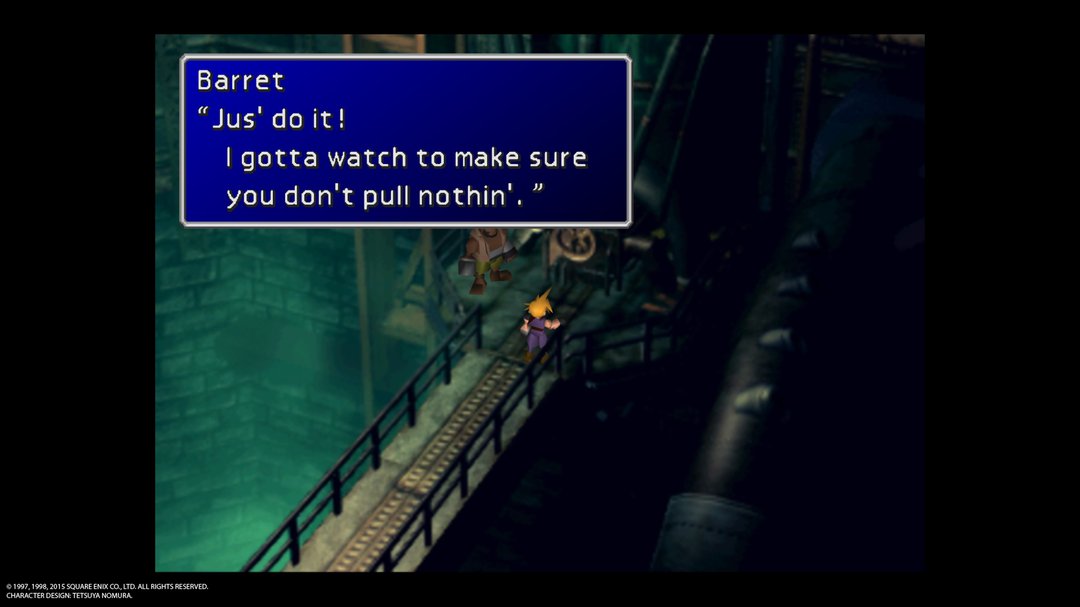
Especially in the original version, where Barret's unspoken dialogue was... unique.
Do I wish they would tone down some of Barret’s over-the-top mannerisms? Yes. But that doesn’t mean I want the voice of, say, a New England banker coming out of his mouth, either. Taking away Barret’s Blackness infers that there is something wrong with certain characteristics typically associated with Black People. I want the character to feel like a black man without an over-exaggerated stereotype. It would have to be nuanced, but it’s possible.
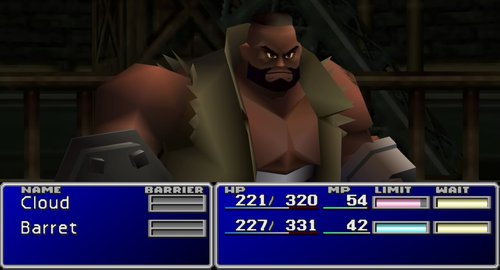
There is something to be said for the fact that we benefit from living in our “woke” times - that people of all backgrounds are finally making sentiments heard that were never understood before by the general public. However, there is a dangerous trend of “knee-jerk wokeness” where the moment stereotypical characteristics are witnessed, there’s an automatic need to push the cancel button, regardless of any positive attributes. I’ve seen a tendency to many a people (especially, quite frankly, white voices) double-down on this approach on social media and Reddit. While I can say that I 100% appreciate the allyship, there’s also a dangerous precedent for negating Black culture representation at the expense of no-tolerance wokeness.
In the end, my fear of this intense backlash is those in the Black community (as well as other minority groups for similar stereotyping offenses) will suffer in the long run. If developers are too afraid to create minority characters “wrong”, they may not create them at all. At the end of the day, I’d prefer a flawed Black character to a non-existent one. I mean, we could just avoid this issue by having more diverse voices in the games development and publishing industry, but that's a whole other article.
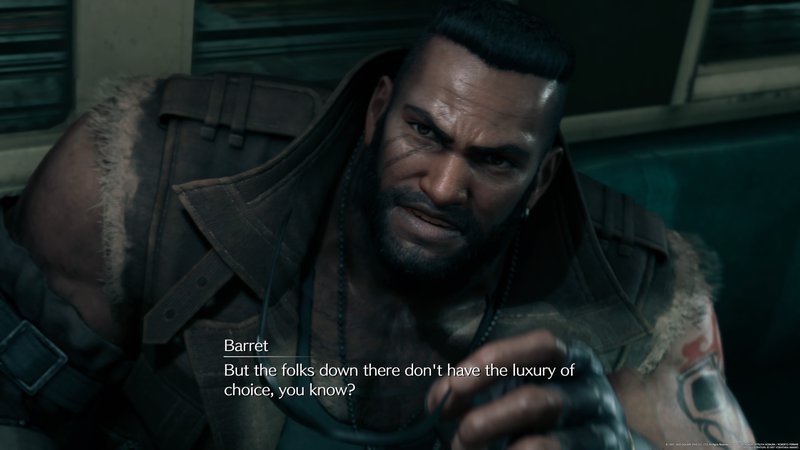
This brings us back to Barret. Truth be told, when I first played the original Final Fantasy VII, I couldn’t discount the constant expletives in his text, the increased amount of linguistics that none of his white counterparts displayed, and his over-exaggerated angry outbursts. However, that paled in comparison to the fact that this is a Black character in a fantasy setting, and a leader to boot. As previously mentioned in my Tabletop RPGS in Color article, many black youths did not experience our likeness beyond the bounds of certain genres. Just seeing a Black character in a world with airships and chocobos that had the ability to summon lightning bolts and fireballs was mindblowing.
Could it be better? Yes. But in 1997, I was just happy to have a character to identify with. While I will get into the details soon enough, I am happy that the 2020 version of Barret has me feeling hopeful.
How To Redeem Your Tokens
Let's pan out the scope for a second away from just Barret. The ever-present use of tokenism is one of the real problems with modern media: the awful tradition of sticking one Black character in a cast, resulting in a half-baked composite of “Blackisms”, or any other minority cliche disguised as a character. The simplest remedy is presenting a multi-racial cast, or at least making the “main” Black/Latinx/LGBT, etc. character just one of many of their represented group, in order to showcase the broad range breadth of cultural representation. Thankfully, Final Fantasy VII has Rude of the Turks, who also carries some Black stereotypes (smooth, cool, sharp suit), but he at least provides some counterweight to Barret’s brashness.
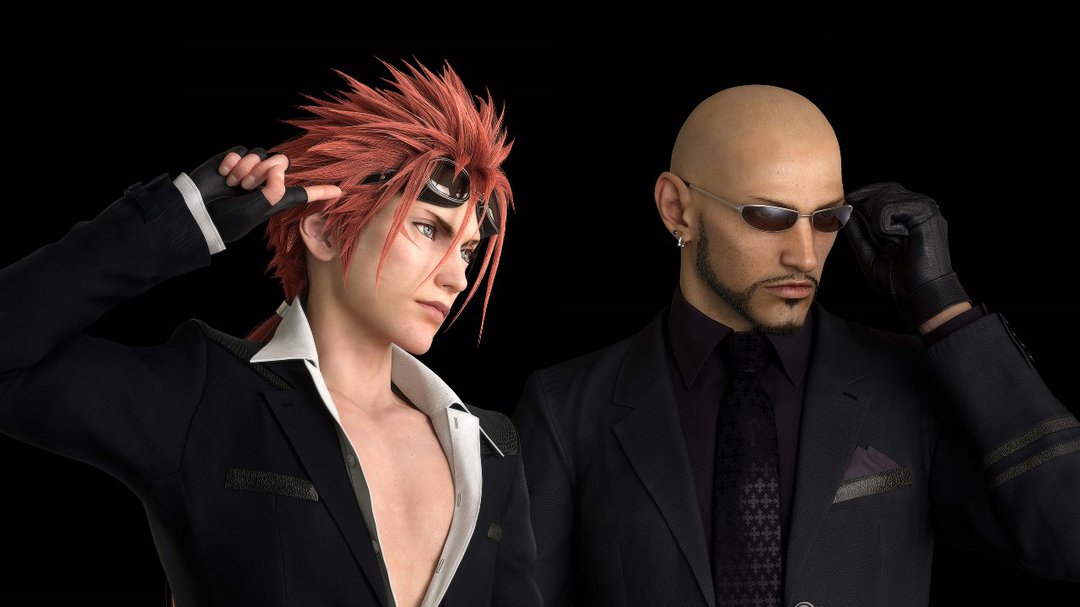
Who doesn't love to hate the Turks? ...Why are they called the Turks? Probably another article right there.
Here’s an example of this approach in action: the hit 90s sitcom The Fresh Prince Of Bel-Air was impactful because it showcased a variety breadth of black characters. Fresh Prince was the first time I remember seeing a wealthy black family depicted on television (and I mean truly 1%, richer than the Huxtables). Juxtaposing that with Will Smith’s straight-off-the-streets of Philly character was goofy, but it examined some interesting ideas about blackness that were not yet portrayed on TV. I especially remember the famous episode where Carlton (the “boogie bougie” cousin of Will) dealt with not being allowed into a black fraternity for “not being black enough”. That was a real, deep-seeded sentiment that many black youths have experienced that had never been given a voice; a unique phenomenon in the minority communities of clashing ideals that the general public would never understand.
Bringing this back to the fantasy genre, let’s compare this with 2000’s Dungeon and Dragons film. Yes, I realize there are many reasons to throw stones at this movie, but just put that aside for a moment to look at something you might have missed in between the blue-lipped henchman and Jeremy Irons’ hammy acting. Take a minute, look at IMDB, and look at this cast. If you’ve seen the film, and you remember Marlon Waylons role in the film...you get exactly where I’m going with this. Even amongst the over-the-top bad acting and crappy effects, Wayans’ buffoonish, cowardly character is jarringly uncomfortable to watch, especially as the only POC in this traditional fantasy-based film. It sticks out like a sore thumb, and makes a singular character carry a lot of weight. The point is, populating a cast with several minorities, portraying a wealth of personality traits and backgrounds, presents a more much balanced approach to racial representation. The fact that the 2020 remake has more cutscenes involving Rude helps lift some of the heavy weight that Barret has carried for decades as an example of Black characters in RPGs.
The tone of racial representation in a source of media comes from the sum of its parts, rather than one character. You can avoid the crucial problem of stereotyping of one character, by preventing a lack of other characters of the same minority group to showcase the breadth of characterization. You can also avoid it by helping spread out character traits over a diverse cast. A great example that comes to mind is actually from the original FF7: Barret isn’t the only character with an aggressive vocal delivery. Beloved pilot Cid (a white character who shows up later) actually has very similar dialogue and character presentation as Barret. He “cusses”, is angry, and even smokes! While he hasn’t made his appearance in Remake yet due to the story being broken up over multiple games, but this is something to take into account. If Barret isn't the only one with their own unique way of speaking, it helps remove the appearance of tokenism.
Celebrating Culture Rather Than Condemning It
There’s one last thing that always bothered me when it comes to the automatic reaction on Barret’s representation, one that’s subtle but not fully understood. Many a critic has come for Barret’s language, overt passion, and working class aesthetic when parsing out his flaws. Why are we trained to LOOK DOWN on working class POC representations, rather than take them into account with other representations? The problem resides when people of color are only represented with a certain aesthetic. If we’re not careful, those scales easily tip to feeling like there’s something inherently wrong with that representation in and of itself, rather than the real problem of tokenism.
It’s that very idea that birthed the long history of Black people feeling the need to code switch. I used certain slang around my home and with Black friends, but the minute I stepped into school, there was an unspoken pressure to ensure every word from my mouth was as close to the “Queen’s English” as possible, as not to incur assumptions about my intelligence. Why was this okay?
The fact of the matter is, American Black culture is a tradition of adapting everything from our language and style to the food we cook and the music we create into a unique tapestry of survivalist art. It’s a diamond crafted from immense pressure: after centuries of enslavement, segregation, and abuse, our culture was bred through the creativity and ingenuity of a race that was made to feel less than for generation after generation. Why aren’t our adaptations of language, style, cooking, and overall presentation celebrated? To cite the trend of films like Shaft and Foxy Brown of the 70s, the magic was presenting our style, our natural hair, our dialect and turns of phrase, and our cultural expressions as something as equally trend-worthy in as the standards of American white culture. There’s a fine line between calling out a stereotype and deciding “how Black is too Black” for general consumption. Tip those scales and the latter is inherently deemed “lesser than” the status quote if we’re not careful.
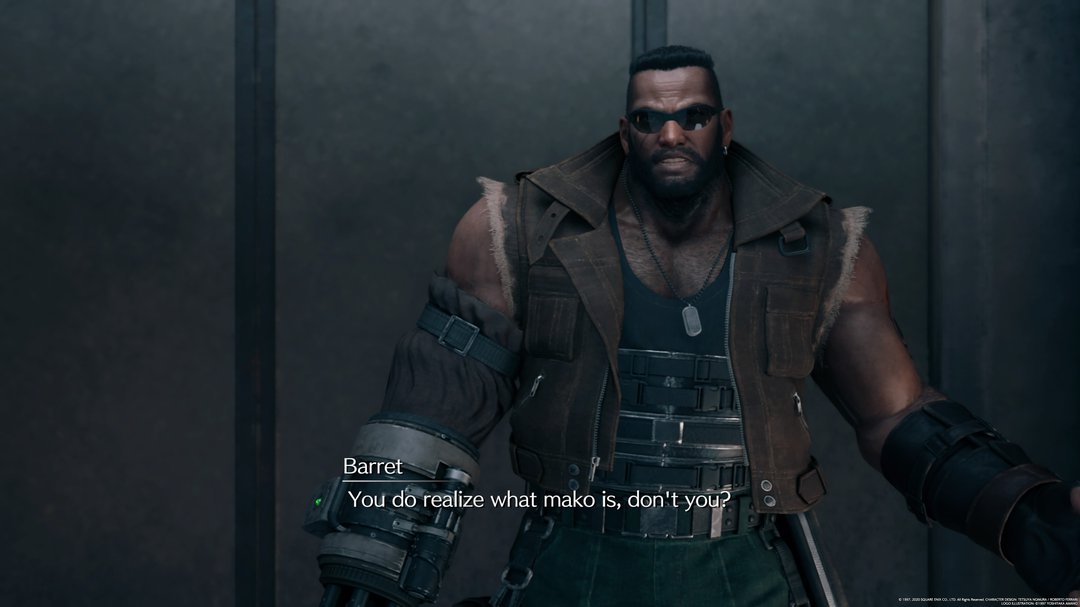
Additionally, I’ve actually seen some gripes that Barret is “too passionate” as a detriment to his character. Almost every Black person in my life is passionate; about our lives, our beliefs, and what we feel is right or wrong. It comes from decades of being oppressed, of watching our parents, grandparents, and ancestors still be affected by the oppression they survived in their lifetime. Not to get too deep in an article about a video game character, but seeing the effects of segregation in my grandparents affects me directly, as it informed who they are as people. In that respect, I see that passion as a foundation of Barret’s own struggle, as he exists as an adoptive father, the leader of a political organization, and a victim of circumstance due to rich corporations exploiting his community. I need a character like Barret to be passionate. To strip that characteristic from him would be an injustice. His drive, however intense, is also a righteous slap-in-the-face to the “lazy” stereotype that we’ve battled for years. Barret is a doer. He acts. He takes charge. He does what needs to get done, despite obstacles that get in his way. Rather than the shortsighted view of finding him “too brash”, maybe there’s something to be said for channeling certain aspects of the Black American experience into a fictional character.
The issue isn’t showcasing Black traits. It’s when they are misinterpreted by white developers, who then boil them down into stereotypes. As has been mentioned time and time again, the easier way to rectify this is speaking with POC, or better yet, pay more attention to titles released by POC, and take freakin’ notes . Hiring people of color on staff for Triple A titles would not only expand the consciousness of game design, but allow for fact checking and smoothing out rough edges that could be offensive. No one can accurately share the stories of a particular group more than the one who lived in their shoes.
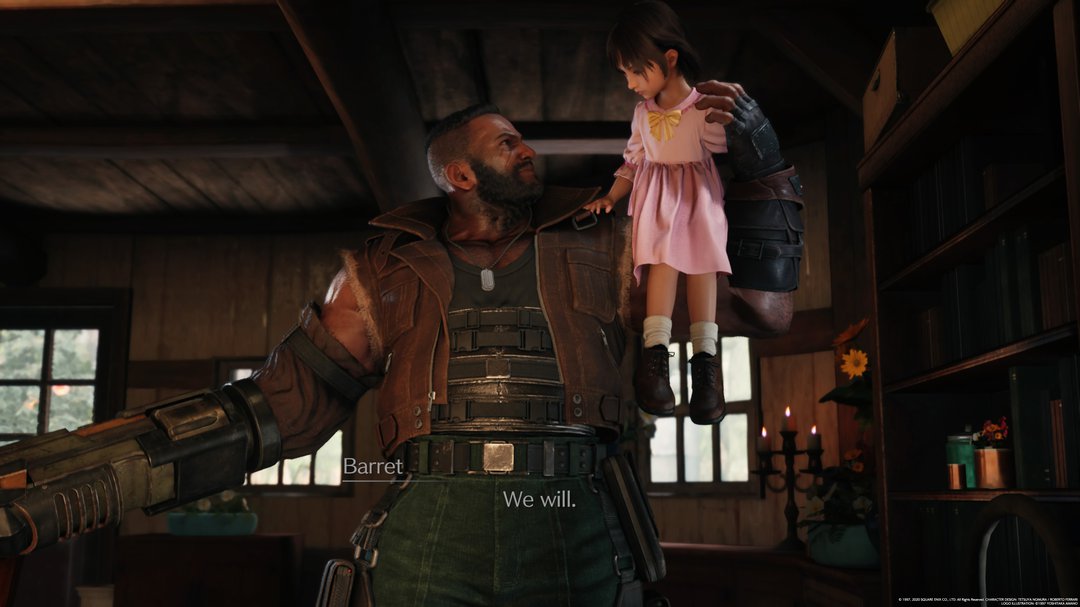
Back To The Hero At Hand
Part of this study of Barret is remembering that even though Final Fantasy VII has been translated and distributed to an American audience, the property is developed in Japan - a culture that is largely homogeneous and doesn’t exactly have a large population of POC to advocate for our representation. Ask any Black anime fan: we’re a long suffering lot.
According to Wikipedia, Barret was designed in early development of the game. Created by Tetsuya Nomura, he was one of the first characters to come to fruition, alongside Cloud and Aerith. During development, project director Yoshinori Kitase suggested that a character in the series should die, and Barret was in the running. Thankfully, Barret was cut out of that running for being “too obvious” (Although, it was referenced briefly in a certain scene in Remake). Dodged that stereotype bullet!
The beauty of FF7 Remake is that the expanded lore allowed for more time with Barret, in which he blossoms, allowing him to shine as a more well-rounded character. There are several scenes where Barret's character truly radiates, exhibiting a growth from his original version. One of my favorites scenes is Barret’s confrontation on the subway train with Shinra’s employees, in which he calls them out for turning a blind eye to the mega corporation’s unjust policies simply to earn a paycheck. These employees know that the work Shinra does is damaging the planet, and Barret isn’t afraid to challenge them about this.
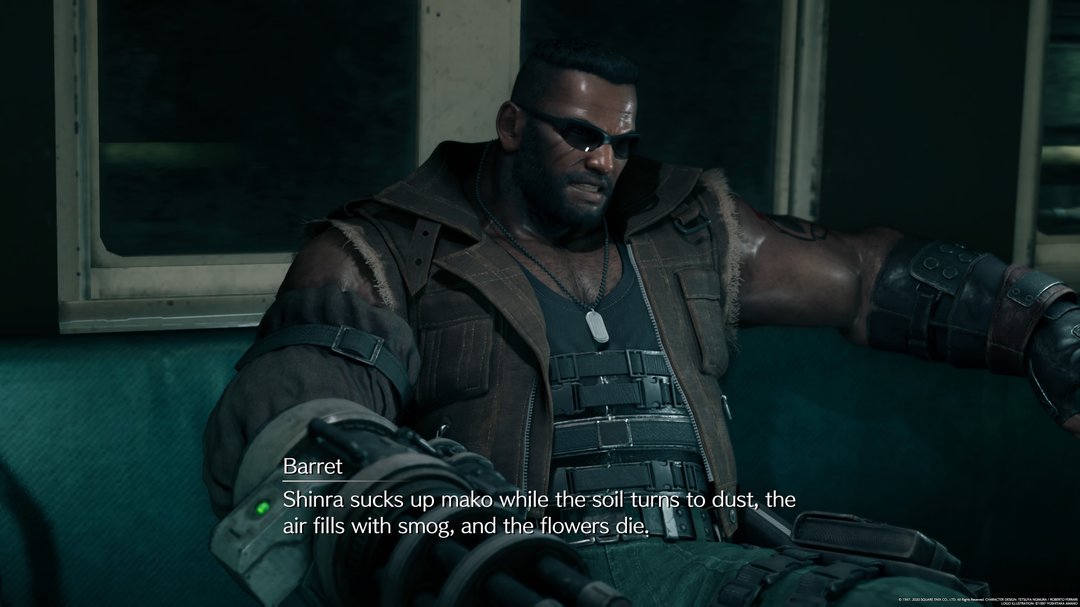
The environmentalism subplot of Final Fantasy 7 hits different in 2020.
On the flip side, Remake spends an ample amount of time showing Barret as a compassionate leader who truly cares about his ragtag group of rebels, with several moments of him motivating and expressing care for his Avalanche subordinates. Particularly, in the scene following the first mako reactor bombing, when the team has doubts and fears regarding the size of the explosion and the fallout of their actions. He reassures Jessie, Biggs, and Wedge that he has their back. “It’s ok, ‘cause I’m here for you! To help take the load off your shoulders,” he says. “Your fears, your worries, your concerns, whatever your problem, I got you.” Top this with the additional scenes of Barret as a father and the multiple sweet moments that showcase his relationship with Marlene. You get the impression of his real affection for her, as well as seeing the guidance he gives her to survive the tough world of the slums. Marlene is spunky and witty, yet appears to be somewhat wise beyond her years. It’s clear that she misses her father when he’s away on his missions, but she also has an understanding that he’s trying to make the world a better place for her and the people around them. Marlene’s character, both alone and interacting with Barret, is proof positive of Barret’s nurturing qualities as a father (and a single father at that).
Credit needs to be given to John Eric Bentley, the voice actor who brings Barret to life in Remake. Having played the original Final Fantasy 7, he stated in an interview with Gamer Hub that he was “thrilled that there was an African American character - a black man who doesn’t die. He wasn’t just there for window dressing, so to speak.” He heavily researches the characters he portrays and made a point to give Barret’s role in Remake the justice it deserved, based on his leadership and the different roles he possesses. Just the weight and gravitas he brings to the scene after the destruction of the Sector 7 elevates Barret as one of the most important and emotionally gripping characters of the game; a complex character dealing with grief, anger, distress, and also consoling fellow team member Tifa all in the span of a few moments. While Cloud’s story has always been the through line, Bentley’s performance magnifies why Barret was truly the heart of Final Fantasy 7: Remake.
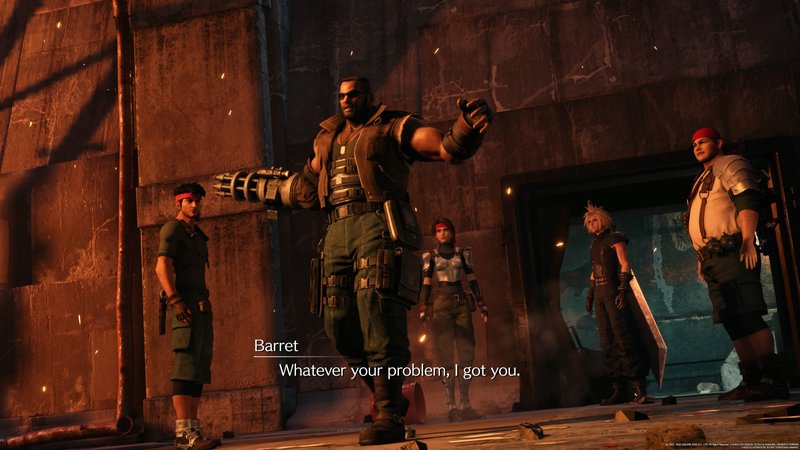
“One of the biggest things I wanted to do, coming into this character...I wanted to justify who he was,” Bentley says in the interview. “Have him not be this big brute, this black man who just shouts and yells and is angry and shoots things with his gun arm. I just wanted him to be way more broader than people could have possibly perceived him back in 1997.” Again, the power of having a Black voice actor bringing Barret to life speaks volumes. The effect is a much more enriched, nuanced, and truthful character presentation.
What Can We Take From This?
With additional chapters remaining in the Final Fantasy VII: Remake story, there are more possibilities for Square Enix to improve their modern take on Barret. Re-introducing this pivotal character opens the gateway to inspire other developers to include accurate portrayals of POC in games where they haven’t traditionally been welcome. My hope, as a longtime Black gamer and fan of fantasy genres, is that we can one day experience ourselves authentically in this medium without the dangers of white-washing and tokenism. For this, continued conversations in public forums and social media is key. It’s important to inform ourselves of what is stereotype and what is nuanced representation, in order to ensure that developers are taking the time to finesse our characters. 1997 Barret, though flawed, was a first step in the right direction, and his 2020 incarnation continues to build upon that with the expanded characterization and a seasoned Black voice actor. If we as consumers can continue to express the good qualities of POC characters in addition to calling out the bad, it will serve us all better in the end.